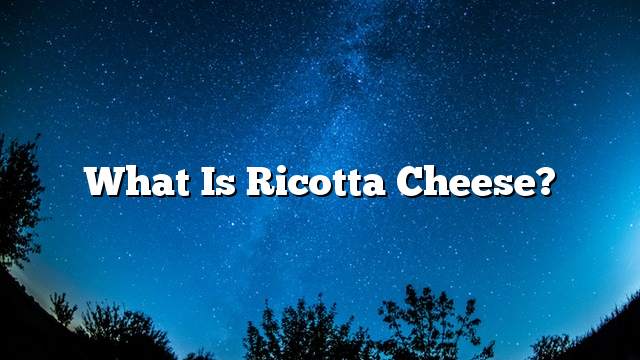Ricotta cheese It is made from whey and milk (whole, low fat or skimmed) by separating it from whole fat milk and is considered to be of good nutritional value because it contains many vitamins and minerals, despite its high calorie calories, usually used in lasagna, pizza, And some Italian desserts such as canola.
The whey is heated in a special container and the temperature is 200 degrees. Then add a little vinegar, lemon juice or olive oil to stimulate the clotting process of the albumin and globulin in whey, then wait until it boils and then turn off the fire and let cool down to 140 degrees or less. Mix so that it is poured quietly and without any vibration so that we get the cheese in the filter (filter tool).
Nutritionally
1 cup ricotta cheese contains 428 calories, 31.9 grams of fat and 125.5 mg of cholesterol. This increases the risk of coronary artery disease or heart disease, although it also contains 7.5 grams of carbohydrates, 27.7 grams of protein, 206.6 mg Of sodium.
Some types of ricotta cheese are free of fat and are therefore the healthiest, with lower calories than fat. 1 cup ricotta cheese contains 160 calories, 60 mg of cholesterol, and contains the same The amount of protein in the first type with a greater amount of carbohydrates, 600 mg of sodium and without any proportion of fat.
Healthily
The ricotta cheese enhances the body’s needs of certain vitamins and minerals such as folic acid, potassium, vitamin A, and also provides:
- 51% of the daily value we produce from the calcium necessary for the growth of bones and teeth.
- 39% of the daily value we need from phosphorus.
- 28% of our daily requirement of vitamin B.
- 22% of our daily requirement of vitamin A.
- 19% of our daily need of zinc.
- 14% of our daily requirement of vitamin B12.
The amounts of vitamins and minerals contained in ricotta cheese are low in fat but very low in whole-fat ricotta cheese.
Is rocita cheese safe for pregnant women?
Some types of soft cheeses are unsafe for consumption during pregnancy. They may contain Listeria bacteria, which may lead to some symptoms that have more serious consequences for the fetus and may result in miscarriage or the birth of the dead fetus. Ricotta cheese is pasteurized and is therefore a good part of a healthy diet. It does not pose a risk to the pregnant or fetus, unlike some other types of cheeses.
